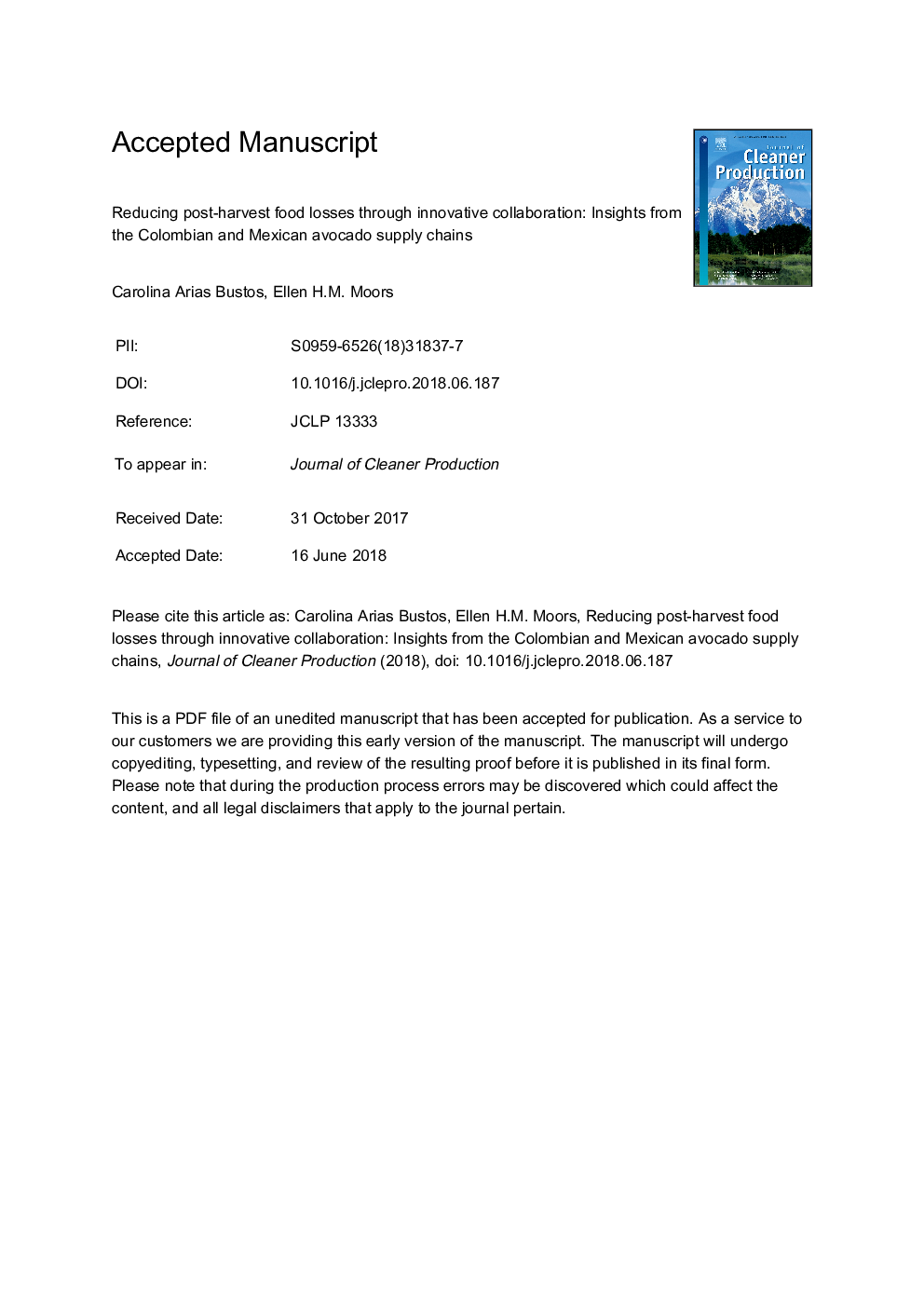| کد مقاله | کد نشریه | سال انتشار | مقاله انگلیسی | نسخه تمام متن |
|---|---|---|---|---|
| 8093359 | 1522053 | 2018 | 52 صفحه PDF | دانلود رایگان |
عنوان انگلیسی مقاله ISI
Reducing post-harvest food losses through innovative collaboration: Insights from the Colombian and Mexican avocado supply chains
ترجمه فارسی عنوان
کاهش تلفات غذا پس از برداشت از طریق همکاری نوآورانه: آمارهای مربوط به زنجیره تامین آگوئا کلمبیا و مکزیک
دانلود مقاله + سفارش ترجمه
دانلود مقاله ISI انگلیسی
رایگان برای ایرانیان
کلمات کلیدی
همکاری نوآورانه، تلفات پس از رسیدن، زنجیره تامین مواد غذایی پایدار، آووکادو،
موضوعات مرتبط
مهندسی و علوم پایه
مهندسی انرژی
انرژی های تجدید پذیر، توسعه پایدار و محیط زیست
چکیده انگلیسی
Postharvest losses along food supply chains have far reaching consequences for the environment and affect the social and economic conditions of food supply chain participants, especially of those in developing countries. This paper explores the structural inefficiencies that lead to postharvest losses and analyses how innovative collaboration could lead to more sustainable food supply chains (FSCs) by reducing those inefficiencies. Innovative collaboration is defined as the improvement or creation of inter-organizational relationships through which FSC participants can exchange information, align incentives, engage in effective partnerships and improve their use of technology. This research distinguishes two research questions: First, how do FSC participants interact and which structural inefficiencies leading to postharvest losses can be identified in global food supply chains? And second, what are the main drivers and barriers of FSC participants to engage in innovative collaboration to reduce postharvest losses within global food supply chains? Two case studies explore the supply chain of avocados, especially due to their high susceptibility to postharvest losses, and focus on avocados from Mexico and Colombia imported into the Netherlands. Data was collected through semi-structured interviews with avocado importers, producers/exporters, packers and growers' associations, governmental organizations, and knowledge institutions. Informal interviews were held with producers and suppliers of other agricultural products traded globally. Using the software NVIVO, the collected data from interviews, documents and literature was structured allowing patterns and categories in the data to be discerned. The contribution of this paper is a typology of structural inefficiencies in global food supply chains, which provides insight into the social drivers of postharvest losses. Three categories of structural inefficiencies leading (directly or indirectly) to postharvest losses were identified: (1) corporate inefficiencies, (2) cognitive and affective inefficiencies, and (3) tangible inefficiencies. Effective partnerships were found to be the backbone of innovative collaboration, and the largest contributor to the reduction of postharvest losses, functioning as catalysts of trust, communication, cooperation and innovation, in addition to contributing to reduce structural inefficiencies along food supply chains.
ناشر
Database: Elsevier - ScienceDirect (ساینس دایرکت)
Journal: Journal of Cleaner Production - Volume 199, 20 October 2018, Pages 1020-1034
Journal: Journal of Cleaner Production - Volume 199, 20 October 2018, Pages 1020-1034
نویسندگان
Carolina Arias Bustos, Ellen H.M. Moors,
